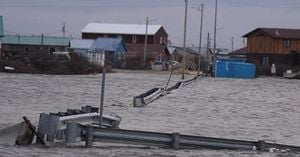On August 27, 2025, during the seventh meeting of his Cabinet, U.S. President Donald Trump made a declaration that has sent shockwaves through legal, political, and civil society circles: his Administration will propose the death penalty for anyone convicted of murder in Washington D.C. The announcement, delivered with characteristic force and repetition, marks a dramatic escalation in the federal government’s approach to crime in the nation’s capital.
"If someone murders someone in the capital, death penalty," Trump stated, according to reporting from multiple outlets. He went on to frame the proposal as a necessary—if severe—preventive measure. "It is a very strong preventive measure," he affirmed. "I don't know if we're ready for this in this country. But we don't have another option." Throughout his address, Trump hammered home the message: "If someone kills someone, it will be the death penalty."
The President’s initiative, which he claims is supported by his entire Administration, is just the latest in a series of federal interventions in Washington D.C.’s public safety. On August 11, Trump had already activated a measure allowing him to assume control over the city’s security for 30 days, citing an emergency legal provision. This move, justified by what Trump described as an "out-of-control crime wave," has been met with both support and skepticism, especially since crime statistics indicate that, while incidents remain high, the overall rate is at its lowest in three decades, as reported by multiple sources including Celebritax.
The federal intervention has led to the deployment of approximately 2,000 National Guard personnel in the city. The initial force of 800 from the Washington National Guard was bolstered by additional troops sent from six Republican-led states: West Virginia, South Carolina, Ohio, Mississippi, Louisiana, and Tennessee. The city’s streets are now patrolled not only by these military forces but also by federal agencies such as the FBI, Drug Enforcement Administration (DEA), Immigration and Customs Enforcement (ICE), and the Metropolitan Police.
Attorney General Pam Bondi provided details on the scale of the operation, reporting that 1,094 people have already been arrested and at least 115 illegal weapons confiscated during the joint effort. The numbers are significant, signaling a robust federal response to what the Administration views as a public safety crisis.
Yet, this show of force and the President’s death penalty proposal have ignited a fierce debate over legality, constitutionality, and the broader implications for civil rights. Washington D.C. formally abolished the death penalty in 1981. Although the district holds a unique status as the federal capital, any move to reinstate capital punishment would require substantial legislative changes and would almost certainly face immediate legal challenges. The proposal’s selective application—targeting only murders committed within Washington D.C.—raises thorny questions about equality before the law, proportionality, and respect for due process.
Legal experts, activists, and policy analysts have been quick to weigh in. Many see the proposal as emblematic of a punitive approach that, in their view, oversimplifies the complex roots of urban crime. According to Celebritax, critics argue that such a measure could undermine fundamental rights and set a dangerous precedent for selective justice. The constitutional debate is further complicated by D.C.’s shared federal and local jurisdiction, a quirk that has long made the district a political and legal outlier.
The increased federal control has also provoked strong reactions from civil rights organizations and activists. They warn that the Administration’s so-called "war on crime" is being used as a pretext to ramp up surveillance and enforcement actions in vulnerable communities, particularly among undocumented immigrants. Reports have emerged of arbitrary detentions by federal agents—especially ICE—during operations that appear unrelated to the stated goal of curbing homicide-related violence. This has stoked fear among immigrant communities, who are already wary due to the Administration’s history of restrictive and aggressive policies.
"The intensification of federal control has sparked criticism from activists and civil rights organizations," notes Celebritax. These groups contend that the Administration’s strategy risks eroding trust in law enforcement and exacerbating tensions in communities that are already marginalized. The specter of arbitrary detention and increased surveillance, they argue, could have lasting negative effects on the city’s social fabric.
Meanwhile, supporters of Trump’s proposal—including some law-and-order advocates and residents concerned about crime—applaud the Administration’s tough stance. They argue that extraordinary times call for extraordinary measures, and that a visible federal presence could serve as a deterrent to would-be offenders. The President himself has repeatedly emphasized deterrence, stating, "It's a very strong deterrent," and insisting, "We have no other choice." For these supporters, the death penalty represents an unambiguous signal that violent crime will not be tolerated in the capital.
Still, the legal and constitutional obstacles are formidable. Washington D.C.’s abolition of the death penalty is well established, and any federal attempt to override local law would likely face immediate court challenges. The complexity of D.C.’s legal status—neither a state nor a typical municipality—adds another layer of uncertainty. As Celebritax and other outlets point out, the proposal would require "profound legislative changes" and would almost certainly be contested on grounds of due process and equal protection.
There are also broader questions about the effectiveness of capital punishment as a deterrent. Decades of research in the United States and elsewhere have produced mixed results, with many studies finding little evidence that the death penalty significantly reduces violent crime. Critics of Trump’s plan argue that resources would be better spent on addressing the root causes of crime—such as poverty, lack of opportunity, and inadequate mental health services—rather than doubling down on punitive measures.
Proponents counter that the unprecedented deployment of National Guard troops and federal agents has already produced tangible results, citing the hundreds of arrests and weapons seizures as evidence of progress. They maintain that restoring order in the capital requires both immediate enforcement and long-term deterrence, and that the Administration’s approach is justified given the stakes.
As the debate intensifies, all eyes are on Congress, the courts, and the people of Washington D.C. The coming weeks will determine whether Trump’s proposal gains traction, or whether it is stymied by legal, political, and public opposition. What’s clear is that the President’s announcement has thrust the issue of crime and punishment in the capital onto the national stage, forcing a reckoning over how far the federal government can—and should—go in the name of public safety.
With the city’s future hanging in the balance, Washington D.C. has once again become a testing ground for the nation’s most contentious debates over law, order, and the limits of executive power.



